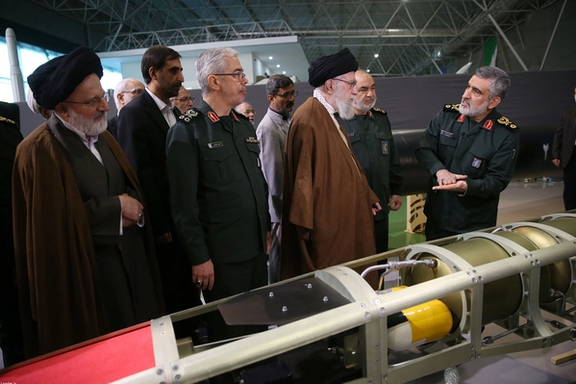US Slaps New Sanctions On Iran’s Arms Supply Network

The US Treasury Department has announced sanctions on 21 Iranian and foreign nationals and entities for involvement in financial networks helping Iran's military.

The US Treasury Department has announced sanctions on 21 Iranian and foreign nationals and entities for involvement in financial networks helping Iran's military.
On Wednesday, the Treasury said those sanctioned helped generate funds for Iran’s Ministry of Defense and Armed Forces Logistics, the Iranian Armed Forces General Staff (AFGS), and the Islamic Revolutionary Guard Corps-Qods Force (IRGC-QF), the extraterritorial wing of the IRGC.
"Iran generates the equivalent of billions of dollars via commodity sales to fund its destabilizing regional activities and support of multiple regional proxy groups, including Hamas and Hezbollah," the Treasury said, referring to the Islamist Palestinian militant group and the Lebanese Shiite armed force and political party.
The Treasury said the Iranian military used "intricate networks of foreign-based front companies and brokers to enable these illicit commercial activities."
US Department of State Spokesperson Matthew Miller noted that Iranian military entities and their business partners enable these sales and exploit the international financial system to recoup the revenue, further fueling the conflict in Israel - which broke out on October 7 following a surprise invasion by Hamas - and spreading terror throughout the Middle East. “The United States will continue to disrupt Iran’s funding support for terrorists.”
The Iranian regime has become the focus of attention in the West after the terror attack on Israel by Hamas which has led to the bloodiest conflict in Gaza since the militant group took control in 2007.
Although voicing unequivocal support for Hamas, Tehran has been denying any role in the bloody invasion that killed around 1,400 Israelis. Iran’s strategy since the 1980s, when it helped establish Hezbollah, has been to use militant and violent groups to build influence around the world and target the interests of Israel and Western countries.
The new round of sanctions includes Iran-based companies Sepehr Energy Jahan Nama Pars Company and Pishro Tejarat Sana Company as well as Iranian citizens Majid A’zami, Elyas Niroomand Toomaj and Abdoljavad Alavi. Treasury also put sanctions on two Hong Kong-based firms, accusing Puyuan Trade Co Limited of brokering sales of tens of millions of condensate, a form of ultralight crude oil, to HK Sihang Haochen Trading Limited.
Also sanctioned were several United Arab Emirates-based firms. These included Unique Performance General Trading LLC, to which Sepehr Energy agreed to sell Iranian light crude for delivery in China, and OPG Global General Trading Co LLC, which offered to sell crude and gasoline on Sepehr Energy's behalf to Persian Gulf customers for onward shipment to Europe, the Treasury said.
In addition, Washington sanctioned Dubai-based JEP Petrochemical Trading LLC, which paid Dubai-based Future Energy Trading LLC the equivalent of more than $400 million to buy Iranian oil from Sepehr Energy.
Three other companies targeted were Dubai-based A Three Energy FZE along with Sharjah-based brokers Tetis Global FZE and Royal Shell Goods Wholesalers LLC, which Sepehr Energy used to enable sales of Iranian commodities to foreign buyers.
After the US, Dubai has one of the largest populations of Iranians outside Iran, both pro and anti regime.
In addition, the Treasury said it had imposed sanctions on four companies and three individuals for supporting illicit financial networks on behalf of the IRGC-QF.
It named the companies as UAE-based Transmart DMCC and Solise Energy (FZE) and as Singapore-based MSE Overseas PTE Ltd and Sealink Overseas PTE Ltd and the individuals as Zabi Vahap, Adelina Kuliyeva and Mehboob Thachankandy Palikandy.
US officials have attributed the prevention of specific weapons parts sales to Iran to a controversial surveillance authority, Section 702 of the Foreign Intelligence Surveillance Act, a tool that is set to expire at the end of the year.
The surveillance effort successfully thwarted multiple shipments of advanced weapons components intended for Iran via land, air, and sea as the CIA and various intelligence agencies leveraged data collected through monitoring the electronic communications of foreign weapons manufacturers. Section 702 allows intelligence agencies to collect and analyze communications such as emails and text messages of foreigners living abroad.
There is a hot debate in Washington over whether to reauthorize the tool or reform it, with the Biden administration arguing that it is crucial to national security and Section 702 will lose much of its usefulness if more guardrails are put on it.
US officials say Section 702 was critical to stopping the weapons sales in the case of Iran’s advanced weapons program. They said they used other spying activities to identify what US-made supplies the Iranians needed, and then plugged the names of those components and their manufacturers into the 702 databases.
Despite US restrictive measures, more and more controls are falling away as Iran is eying even further market for its cheap drones and missiles. Last month, the UN sent letters to countries announcing the end of bans on Iran's missile program, removing barriers for the clerical regime to sell dangerous technologies. Iran, historically allied with Russia, faces accusations of supplying lethal drones to Moscow for use in Ukraine, though it asserts its neutrality in the conflict. Iran is now free to sell its drones, ballistic missiles, and related long-range strike technologies to its anti-Western partners and clients and can also procure technology for further development.